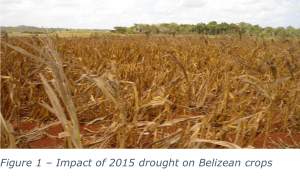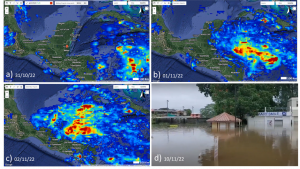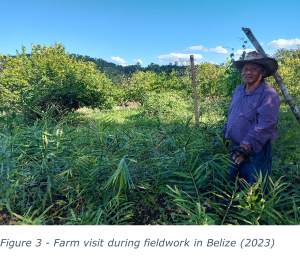March 27, 2023, by lzzre
Integrated ClimAte Resilience UnderStanding (ICARUS), Belize
Blog by Betsabé de la Barreda-Bautista, Sofia Mardero, Oriol Ambrogio Gali, Franziska Schrodt and Sarah Metcalfe
Extreme weather events, such as hurricanes, droughts, and floods, are becoming more frequent and severe around the world. However, developing countries are particularly vulnerable, and the consequences of extreme events can be devastating. This is especially true for countries like Belize in Central America, where these events pose a significant threat to the safety and well-being of communities and farming systems (Fig. 1), as well as having long-term impacts on the environment and the economy. The World Bank has ranked Belize as 8th out of 167 countries for its vulnerability to climate risks. These numbers highlight the urgent need for measures to mitigate the impact of natural disasters and climate change in Belize. 
This is how our Integrated Climate Resilience Understanding (ICARUS) Belize project emerged, as an opportunity to better understand the impacts of extreme events on natural and social systems and to find effective tools and strategies to detect and respond to these events. Our project creates an innovative approach to assess the impacts of, and recovery from, both extreme (e.g., hurricanes, floods) (Fig. 2) and slow-onset (e.g., droughts) climate events by ensuring the integration of ecosystems and human systems at different temporal and spatial scales.

Figure 2 – a), b) and c) Trajectory of Hurricane Eta 2022; d) Flooding at San Ignacio, Belize after Eta
Our project, led by Prof Sarah Metcalfe at the University of Nottingham, with colleagues from the University of Liverpool and UCL is funded by the Leverhulme Trust. It is a collaborative effort between a multidisciplinary team, including physical and human geographers, earth observation scientists, historians, environmental change experts, and local community members. The project aims to provide a deeper understanding of Belize’s resilience to extreme climate events by combining multiple sources of information at different time scales. The approach integrates instrumental records, such as rainfall and temperature data, satellite imagery, community experience, including traditional knowledge and practices, historical records, such as such as letters, diaries and maps, and palaeoenvironmental data, such as pollen and isotopes. ICARUS is using a combination of qualitative and quantitative methods to analyse the data and modelling techniques to simulate climate scenarios and assess their potential impacts on Belizean communities and the environment.
This multifaceted approach will provide a more comprehensive and nuanced understanding of how socioecological systems in Belize has coped with past climate events and how they can improve resilience for the future and create a more effective and responsive system for detecting and responding to extreme weather events.
Gathering instrumental records is a critical component of our project and has been the most challenging part of the project so far. We have found that there is limited availability of meteorological data, and theavailable data is not well represented spatially across Belize and not available over long periods of time. Many of the stations across Belize were only started in the last ten years and there are issues with validation and QA processes. Our project requires spatial data at the sub-national or local level to identify regions that are most vulnerable to changes due to extreme events or climate change, reflected in temperature and rainfall patterns. Other data sources, such as remotely sensed data and reanalysis data, are being explored.
Despite the challenges, we have managed to grow our network of contacts in Belize during a first period of fieldwork in early 2023 thanks to, and in company with, our project partners and advisory panel (Ya’axche Conservation Trust, the Caribbean Community Climate Change Centre, the Ministry of Agriculture, Food Security and Enterprise in Belize, ECOSUR in Mexico, Baylor University in USA and Northumbria University in the UK). In addition to the community work done, which is material for our next blog, the fieldwork allowed us to understand more about how farming systems work across the country (Fig. 3), and how different organisations within the region work. We have learned how different groups of institutions and society monitor their own crops and climate independently. We hope that this acquired understanding will help fill our data gaps and analysis and also build and strengthen local capacity for data analysis.
By the end of the project we hope to gain a comprehensive understanding of the resilience of Belize towards extreme climate events and how it can be used to inform future planning and decision-making. Our research will yield valuable insights into Belize’s resilience to extreme climate events. We are excited to share our findings with the community through our upcoming blogs. Stay tuned for more information and our latest results!
No comments yet, fill out a comment to be the first


Leave a Reply